Archive for July, 2012
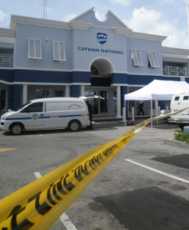
Police charge fifth man in bank robbery gang
 (CNS): In what has become a notable success for the RCIPS, a police spokesperson confirmed that a fifth man was charged on Friday and appeared in Grand Court in connection with the recent bank robbery at Cayman National in Buckingham Square. The 32-year-old was charged with robbery and possession of an imitation firearm with intent to commit an indictable offence, the RCIPS said. Police have already charged Andre Burton (27) of West Bay, who is accused of being the gang’s second getaway driver, as well as George Mignott (23) from Savannah and Marlon Dillon (29) from West Bay, who are both charged with robbery and possession of an imitation firearm.
(CNS): In what has become a notable success for the RCIPS, a police spokesperson confirmed that a fifth man was charged on Friday and appeared in Grand Court in connection with the recent bank robbery at Cayman National in Buckingham Square. The 32-year-old was charged with robbery and possession of an imitation firearm with intent to commit an indictable offence, the RCIPS said. Police have already charged Andre Burton (27) of West Bay, who is accused of being the gang’s second getaway driver, as well as George Mignott (23) from Savannah and Marlon Dillon (29) from West Bay, who are both charged with robbery and possession of an imitation firearm.
The three masked men who held up the bank on the morning of Thursday, 28 June, escaped with around a half million dollars as they attempted to flee the scene. However, they collided with an armoured cash van and the men then headed off on foot. As they fled scene they are believed to have dropped around $100,000 of the cash booty before being picked up by another getaway car.
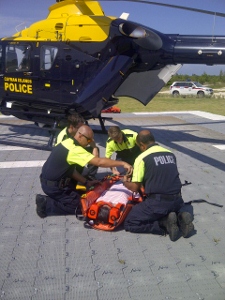
Chopper now air ambulance
 (CNS): Four members of the RCIPS Air support unit have been certified as emergency medical responders and, as a result, the police helicopter will now be able to act as an air-ambulance. Staffed by the tactical flight EMR officers who have been trained by the Health Service Authority, the chopper will enhance and support first line medical response in Cayman, especially in difficult locations or where time is critical to saving lives. The police commissioner said that, despite the controversies surrounding the machine, it continued to enhance the services the police could deliver to the community.
(CNS): Four members of the RCIPS Air support unit have been certified as emergency medical responders and, as a result, the police helicopter will now be able to act as an air-ambulance. Staffed by the tactical flight EMR officers who have been trained by the Health Service Authority, the chopper will enhance and support first line medical response in Cayman, especially in difficult locations or where time is critical to saving lives. The police commissioner said that, despite the controversies surrounding the machine, it continued to enhance the services the police could deliver to the community.
This initiative means that the RCIPS Air Operations Unit is now classified as one of the first ‘Helicopter Emergency Medical Service’ (HEMS) of its kind in the region and it will also now carry medical equipment, such as a heart defibrillator that was donated to the RCIPS by the Cayman Heart Fund. Helicopter awareness and safety training for the EMT paramedics is also underway and this will allow qualified health professionals to be deployed on board the helicopter when needed.
Police Commissioner David Baines said he was pleased about the partnership with the HSA and the Air Support Unit (ASU) as the helicopter, which had already saved lives, would save more in future. Now able to be deployed in a medical emergency as well as used in crime fighting and border patrol, the helicopter’s role as an air ambulance would be a priority for the ASU, Baines explained. He said that where there was a choice between a drug interdiction and a life to be saved in a critical road accident, the life would come first.
“This project will help us get the right people to the right situation where minutes cost lives," he added. “It’s about getting the most out of this expensive piece of equipment.”
Baines said that the chopper had completely changed the way the RCIPS was able to fight crime and the more uses the machine could be put to, the more value for money the public would get from the investment. He said that the RCIPS was still learning how best to use the helicopter and it was important to enhance the services it can offer, such as adding emergency medical support.
“The arguments will always go on about the helicopter … but this has changed the way we fight crime and has been an invaluable tool,” Baines said.
Neil Mohammed, Ronnie Pollard, Steve Day and Danny McIlhagga, the four crew members who recently completed the accredited EMR course, have been trained in CPR; managing muscle, bone, head and spine injuries; assisting with childbirth; and mass casualty incidents and triage.
The remaining members of the Air Operations Crew will be trained in August. A number of Marine Unit officers will also attend that course and all of the police officers who complete the EMR course will be regularly assessed to ensure that they continue to meet the stringent standards required, officials said.

Accountability in OMOV and SMC
As we draw nearer to the Referendum on 18 July 2012, much has beensaid concerning one man, one vote (OMOV) in single-member constituencies (SMC) and the attendant equality of voters. Therefore, by now, everyone with an open mind probably understands what is meant by voter equality. However, it is the issue of accountability that seems somewhat elusive and is being complicated by the anti-OMOV rhetoric of opponents.
Accountability should not be confused with equality in the number of registered voters in an SMC. It is about the quality of representation and not the number of voters represented.
Therefore, a representative has an obligation and should be willing to give satisfactory reasons to his or her constituents for any actions he or she may take while serving as their representative. With an SMC one can safely say that a representative has little choice but to be responsive to their constituents simply because there is no one else to blame for their actions or lack thereof.
A case in point is the ForCayman Investment Alliance between the Cayman Islands Government (CIG) and Dart Realty. Whether you are in favour of or opposed to the proposed closure of part of the West Bay Road or the movement of the landfill to Bodden Town, it is evident that approximately four thousand residents, primarily those in the three larger multi-member constituencies (MMC), believe their interests were ignored by their representatives. They contend that this only occurred because they account for a minority of the votes in each MMC. In other words, in each MMC, they are merely a voice within the crowd.
Now contrast the above with East End and North Side. Having only one representative each because of the smaller number of registered voters, they in fact each operate as an SMC where a smaller population enables everyone in those districts to become a name and a face within the community where their vote matters and, consequently, their voice matters.
Therefore, when the residents of those districts opposed the East End Seaport in 2011, as it was perceived by residents that it would adversely affect both districts, their elected representatives had no choice but to join the fight. What justifiable reason could they give for abstaining from involvement? Therefore, if the current polling divisions of George Town North, West Bay South and Bodden Town were each an SMC when the CIG and Dart Realty deal was proposed the representative of each SMC would have had no choice but to canvass the views of their constituentsas to the perceived pros and cons and then represent accordingly.
Consequently, in an SMC each voter has a single, easily identifiable, district representative who has no opportunity for passing the buck. This encourages a stronger connection between representative and constituent, which itself enhances accountability. He or she is therefore more likely to be responsive to his or her constituents than to their party. Furthermore, incumbent politicians in an SMC tend to be difficult for party leaders to remove, which gives them a degree of independence from their party.
While not putting it forward as their policy, opponents of OMOV have recently introduced the concept of a national vote where the first 18 candidates receiving the most votes would be declared the winners. Though not inconsistent with the use of one man, one vote and equality of voters, it would do nothing to improve accountability and responsibility. If it is possible to avoid accountability and responsibility at the district level it would be much easier to do so at a national level. It would also decrease the representativeness of the LA as it would no doubt be populated by candidates from the larger districts, leaving smaller districts with no representation. Furthermore, a national vote would do nothing to remedy the perception that introducing OMOV in an SMC will make our politics increasingly parochial. Therefore, a national vote would be counterproductive.
Another objection is that an SMC would be too small and allow elections to befixed. In fact there has been far more controversy regarding fair elections in the Cayman MMC than in any SMC.
Therefore, accountability is inextricably linked to responsibility. Accountability does not mean absolute and total perfection from a representative but it does demand that a representative be willing to provide justifiable reasons for their action or inaction. In an SMC with a smaller number of voters, the explanation is more likely to be forthcoming from the representative since no representative can afford the risk of losing any vote with so few available.
As a result, although the voters' ultimate recourse in an SMC and an MMC is to vote to change their elected representative at the end of an election cycle, the power of the voters in an SMC to compel their elected representative to act is greater. Thus an SMC gives the voters a better chance to effect change within an election cycle as opposed to once every four years.
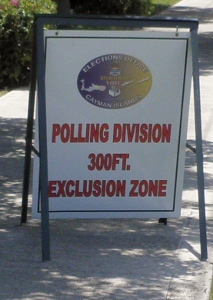
West Bay voters need to check voting locations
 (CNS): Although most people will voting at the same polling stations in Wednesday’s referendum as at the last general election as a result of some venues being used for other things in West Bay the elections office is reminding voters in that district that they will need to check the alternate location for where they should vote. Voters registered in West Bay Central will be voting as normal at the John A. Cumber Primary School, 44 Fountain Road but other West Bay voters will be polled at different sites. Constituents in West Bay NorthWest (WBNW) who would normally vote at New Testament Church of God – on Boatswain Bay Road are being redirected to the Presbyterian Church of Boatswain Bay on the same road.
(CNS): Although most people will voting at the same polling stations in Wednesday’s referendum as at the last general election as a result of some venues being used for other things in West Bay the elections office is reminding voters in that district that they will need to check the alternate location for where they should vote. Voters registered in West Bay Central will be voting as normal at the John A. Cumber Primary School, 44 Fountain Road but other West Bay voters will be polled at different sites. Constituents in West Bay NorthWest (WBNW) who would normally vote at New Testament Church of God – on Boatswain Bay Road are being redirected to the Presbyterian Church of Boatswain Bay on the same road.
Meanwhile, voters in West Bay East (WBE) will be voting on the vacant lot across from Foster’s Republix West Bay on the corner of Willie Farrington Drive & West Bay Road instead of the Church of Christ at Batabano Road and registered voters in West Bay South (WBS) are to vote at the front of 88A North West Point Road and not the John Gray United Church Hall.
All other voters across Cayman are asked to go to the same polling station for the Referendum as they did for the 2009 General election.
All polling stations open at 7am and remain open until 6pm and all registered voters are encouraged to come out and exercise their democratic right. As a result of the referendum only being binding if more than 50% plus one of the electorate vote anyone who believes in one man, one vote but remains home will in effect be adding to the ‘No’ vote.
See polling locations posted below
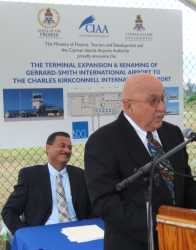
No loan needed for Brac airport upgrade, says CIAA
 (CNS): The expansion of the Cayman Brac airport terminal will be funded by the Cayman Islands Airports Authority (CIAA), which will not need a loan for the project, according to the authority’s CEO, Jeremy Jackson. Phase One, which will roughly double the size of the airport building, will include renovations of the existing facility as well as the expansion to the east side. Phase Two, which is a planned expansion on the west side of the existing terminal building, will be built at a later date when the CIAA has the funds to do it. The cost of Phase One, Jackson said, would not be revealed until after the tendering process was complete, and this will be going to the Central Tenders Committee “shortly”. (Photo: L-R Jeremy Jackson and CIAA board chair Dick Arch)
(CNS): The expansion of the Cayman Brac airport terminal will be funded by the Cayman Islands Airports Authority (CIAA), which will not need a loan for the project, according to the authority’s CEO, Jeremy Jackson. Phase One, which will roughly double the size of the airport building, will include renovations of the existing facility as well as the expansion to the east side. Phase Two, which is a planned expansion on the west side of the existing terminal building, will be built at a later date when the CIAA has the funds to do it. The cost of Phase One, Jackson said, would not be revealed until after the tendering process was complete, and this will be going to the Central Tenders Committee “shortly”. (Photo: L-R Jeremy Jackson and CIAA board chair Dick Arch)
However, he said that the enabling works should commence sometime in August.
Critically, the first phase of the upgrade of the Charles Kirkconnell International Airport (CKIA), as it is now called following a renaming ceremony on Saturday, will include hold baggage screening equipment, which will enable the airport to facilitate direct flights to the US, since this is a Federal Aviation Administration (FAA) requirement. Currently, the airport has direct flights arriving from Miami but passengers travelling from the Brac to the US must stop at Grand Cayman, which adds an extra flight and sometimes many hours to the journey.
Once Phase One of the project is complete, the airport will have a larger check-in and ticketing counter, enhanced passenger and baggage screening facilities and outgoing immigration counters. The departure lounge will also be expanded to create additional retail space and a larger restaurant. There will be additional office space for Cayman Airways and for the airport’s Security Unit, which will also have CCTV security. For the first time, the Brac airport will have a VIP lounge, Jackson told CNS.
Phase two of the project will see enhancements to the arrivals hall (immigration and customs areas) as well as the addition of space for the Public Health and Agriculture departments.
As the terminal facility is to remain operational during the construction phase, the CIAA says that efforts will be made to carry out the work with minimal interruption to passenger processing. The authority says there will be some temporary relocation of functions to allow for refurbishments to be carried out on the existing facility.
At Saturday’s renaming ceremony, Jackson said the expansion project would undoubtedly provide a much-needed boost to the Brac’s economy. “We are confident that the ability to attract direct international flights, without the stopover in Grand Cayman, will provide even greater opportunities for local businesses in the years ahead. The CIAA looks forward to playing its role in the continued economic development of Cayman Brac and Little Cayman,” he said.
In his address at Saturday’s ceremony, Premier and Tourism Minister McKeeva Bush also noted that in the event of an interruption to operations to Grand Cayman’s Owen Roberts Airport because of a natural disaster or an aircraft accident, as an international airport, the Brac’s CKIA would serve as a lifeline for the Cayman Islands.
The premier said the airport, which was being renamed for “a son of Cayman Brac”, the late Captain Charles Kirkconnell, who had served as an elected representative for Cayman Brac and Little Cayman for three consecutive terms from 1976 to 1988 and had also served on the Executive Council (now called Cabinet).
He recalled how the Brac’s Gerrard-Smith Airport had been officially opened during the royal visit of Princess Alexandra in 1988. He said that Captain Charles, as well and his permanent secretary at the time, Sammy Jackson, who was present at Saturday’s event, had been instrumental in the building of the airport and it was fitting, given all of his valuable contributions to the islands, that the airport should be renamed in his honour.
Astwo past Cayman Islands commissioners, Andrew Gerrard and Ivor Smith, for whom the airport was previously named, were consigned to the history books, Deputy Premier Juliana O’Connor-Connolly explained how the renaming would mean that Captain Charles would be remembered whenever people arrived on the Brac. He could “easily be forgotten if we don’t recognize those nation builders,” she said.
In his vote of thanks, CIAA Chairman Richard “Dick” Arch recognized the efforts of the CIAA’s Project Manager Nicholas Johnson, the lead architect Donal McGrath of BDCL Architects, BCQS Quantity Surveyors, District Commissioner Ernie Scott, and various other government agencies, as well as other individuals who had made significant contributions to the project thus far.
Arch expressed his confidence that the people of Cayman Brac and Little Cayman would be proud of their enhanced terminal when the expansion concludes in 2013.
Related articles:
Capt. Charles Leonard Kirkconnell, OBE, 1922-2010

Police charge suspect TV robbers
(CNS): Four men are expected to appear incourt on Monday charged in connection with the robbery at the WestStar offices in May. Continuing their recent success in rounding up suspected armed robbers the police said Friday that three men, aged 23, 27 and 33 years, have been charged with robbery and possession of an imitation firearm with intent to commit an indictable offence while a fourth man who is 29 has been charged with handling stolen property. The men are accused of holding up staff at the customer service offices of the local TV station in George Town during a daylight heist.
The charges come in the wake of a series of arrests over the last week or so in connection with an armed robbery at Cayman National Bank last month when three masked and armed men stole around a half million dollars. However, the men collided with an armoured cash van as they attempted to getaway and dropped some $100,000 when they were forced to flee on foot.
Shortly after the daylight bank heist police arrested one man in an operation in West Bay and soon rounded up seven suspects in connection with both the bank and WestStar TV hold ups.
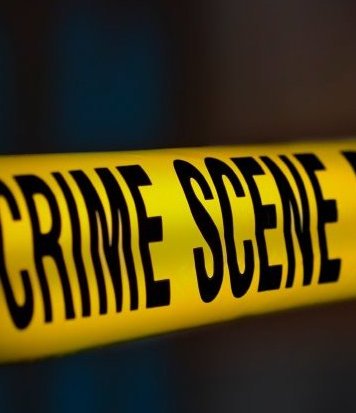
North Side man arrested following drug bust
 (CNS): Police have arrested a 20-year-old man and seized his car after a drug bust in North Side yesterday afternoon. An RCIPS spokesperson said the operation led to the recovery of an undisclosed quantity of ganja and drugs paraphernalia. The North side man was arrested for possession with intent to supply ganja, possession of ganja and suspicion of consuming a controlled drug. Insp. Mitchell, the Deputy District Commander for the Eastern Districts said the bust demonstrated a commitment to addressing crime impacting the district.
(CNS): Police have arrested a 20-year-old man and seized his car after a drug bust in North Side yesterday afternoon. An RCIPS spokesperson said the operation led to the recovery of an undisclosed quantity of ganja and drugs paraphernalia. The North side man was arrested for possession with intent to supply ganja, possession of ganja and suspicion of consuming a controlled drug. Insp. Mitchell, the Deputy District Commander for the Eastern Districts said the bust demonstrated a commitment to addressing crime impacting the district.
“We will work diligently to ensure that the residents of the Eastern Districts receive a quick response to issues that affect our communities. This also serves as a strong warning to people who engage in illegal drugs activity that we will seize all evidence necessary as we carry out the investigation,” he said.
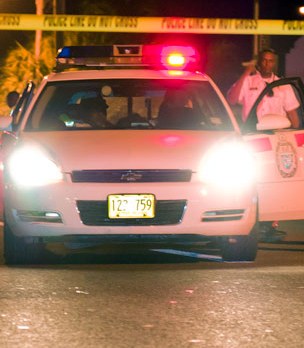
Cops arrest teen over gun
 CNS): Police have a arrested a 16-year-old boy in connection with a number of serious offences, including the possession of a firearm and ammunition as well as stealing a car. An RCIPS spokesperson said the youngster was apprehended by officers on Thursday afternoon following a break-in at a Bodden Town address. The teenager was arrested after the police spotted what was reported as a stolen vehicle which had left the scene of the burglary at the Cayman Crossing condo complex in South Sound Road, George Town.
CNS): Police have a arrested a 16-year-old boy in connection with a number of serious offences, including the possession of a firearm and ammunition as well as stealing a car. An RCIPS spokesperson said the youngster was apprehended by officers on Thursday afternoon following a break-in at a Bodden Town address. The teenager was arrested after the police spotted what was reported as a stolen vehicle which had left the scene of the burglary at the Cayman Crossing condo complex in South Sound Road, George Town.
Police were informed that the suspected burglar had left the scene in a stolen Honda CRV, which was later seen by officers in the South Sound area, where the driver stopped the vehicle and ran off. Officers gave chase and arrested him a short distance away from the abandonded stolen car. The gun and an undisclosed quantity of ammunition were subsequently recovered.
Police said the teenager has been arrested on suspicion of possession of an unlicensed firearm, burglary and taking and driving away a vehicle without the owner's consent. He remains in police custody while enquiries into the matter continue.

From self-reliance to the loser-mentality
The Cayman generations of the 40’s 50’s and 60’s and before were world-renowned for their self reliance and tenacity in the face of adversity. The men were sometimes called ‘iron-men’ who mastered ‘wooden ships’ and later some of the world’s largest super tanker and ore carriers. The strength and resilience of the women were reflected in their management of their family’s affairs, their child rearing skills and their instilling of strong values in their children.
Self reliance and strength of moral character were a key part of the Cayman psyche.
That was then but this is now.
Update to the second decade of the 21st century and the 'loser-mentality' has enveloped almost every aspect of our society, from top to bottom.
The change came relatively quickly during the 70’s 80’s and 90’s as the financial, real estate and tourism industries exploded. Those generations were not prepared for the sudden inflow of wealth and the educational requirements to compete in this new society.
Successive British administrators and later elected governments failed to have the foresight to predict the future needs of the country and its people. Caymanians wanted and deserved to stay at home and enjoy the new found wealth in their own country, rather than to traverse the oceans as seamen.
The sale of our lands and beaches brought instant wealth to many – a wealth that only a few managed to invest wisely, and only a minority managed to acquire the aggressive skills and educational background necessary to survive in this new economy.
By the late 90’s a good proportion of the then-generation had managed to acquire better educational backgrounds, many by studying abroad. They returned home full of excitement and enthusiasm only to find out that those who had helped to create the tourism, legal and financial industries were not as welcoming to locals into these industries as the locals had earlier welcomed them to Cayman to establish themselves and these industries in the country.
As the economic boom diminished, it is not surprising that discontent and crime increased rapidly as it has in the local population in the past 20 years.
We are at the beginning of the second decade of a new century and our situation has deteriorated beyond belief. Those that we welcomed to our country now own the best beaches, the best homes, the best jobs, and control the wealth that Caymanians believed theydeserve and would have received.
There are many factors that brought us to where we are. So who do we blame for our plight? There is plenty of blame to go around, but the blame-game is a road that has no end, and will go on forever, and it will accomplish nothing but hatred and disharmony in the society.
My suggestion is that we blame no particular group or party. We stop targeting others for our misfortune. We examine where we are and look back at how we got here, but don’t waste our time or energy blaming others.
We need to look at ourselves individually and ask: ‘Do we still have any moral values? Do we have any pride left in our being? Are we self-reliant like our forefathers? Do we have the attitude that we can change the plight of our family and our country? How do we improve our own lives and the lives of those around us?’
As I said at the beginning, the loser-mentality has a stronghold in our society. Our moral character and spirit of self-reliance has for the most part been buried with our grand-parents and parents.
A large section of our population will apparently sell our souls for a few dollars, a new appliance here, a promise of a job there, a financial benefit or other gift in exchange for your vote. A special relationship with government that benefits ourselves, but we know that it is at the expense of the society generally.
These benefits of getting something for nothing, of gaining at the expense of our country, of a special deal that puts us at an advantage over our competitors are, my friends, the underbelly of corruption.
It does not matter how poor you are or how rich you are, YOU ARE A LOSER if you accept gifts from someone, whether it be a dollar or a special contract, in exchange for anything that benefits yourself and that someone in a position of trust.
We need to rise above this, otherwise our society will become so embedded with corruption that there will be no hope for our children’s future. We will become dependent on the bearer of gifts who have ulterior motives that will eventually harm us more than it helped us.
The greatest harm of all is that our moral values and spirit of self reliance will become just a memory of the greatest part of who we were, a long time ago.
We can do better than this, my friends. Start by not being tricked into believing that we can get something for nothing. We can individually rebuild our values and self- reliance one step at a time – no matter how poor or rich we are.
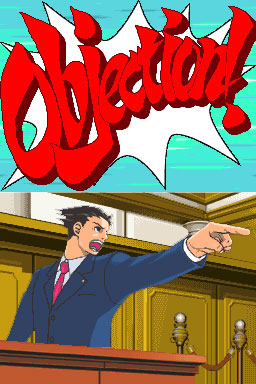
Consultation ends on controversial legal aid bill
 (CNS): Government must now decide whether to take note of the extensive comments it received from the Cayman’s Criminal Defence Bar Association on its latest efforts to address the vexing issue of funding the country’s mounting legal aid bill. Friday is the deadline for submissions on the proposed legislation, which will require all lawyers to work for free for 25 hours per year or pay $2,500 to help fund criminal justice for those that can’t afford an attorney. The proposals, however, were sharply criticised by the small pool of local lawyers that are currently doing legal aid work and said it would make things even worse. The CDBA said it was an unjustified attack on lawyers representing people facing criminal charges and in particular those doing legal aid work.
(CNS): Government must now decide whether to take note of the extensive comments it received from the Cayman’s Criminal Defence Bar Association on its latest efforts to address the vexing issue of funding the country’s mounting legal aid bill. Friday is the deadline for submissions on the proposed legislation, which will require all lawyers to work for free for 25 hours per year or pay $2,500 to help fund criminal justice for those that can’t afford an attorney. The proposals, however, were sharply criticised by the small pool of local lawyers that are currently doing legal aid work and said it would make things even worse. The CDBA said it was an unjustified attack on lawyers representing people facing criminal charges and in particular those doing legal aid work.
The association also warned that having unqualified and uninsured lawyers from across the legal profession doing pro bono work representing people charged with crimes could present significant human rights problems.
In the submission, as part of the draft legal aid bill's discussion period, the CDBA president, on behalf of the entire membership, pointed to a long list of problems with the draft bill. John Furniss said that lawyers from across the various legal disciplines would not be in a position to assist with criminal defence cases and that limiting legal aid lawyers’ work load would create far more problems than it solves.
“The Cayman Islands already suffers from a chronic shortage of attorneys willing and able to undertake publicly funded work,” he wrote in the submission paper.
Although the Cayman Islands is home to more than 500 lawyers, most of them specialize in offshore finance and commercial work. Only a very small percentage of local advocates are criminal attorneys with no more than a dozen willing to do the critical legal aid work.
In an effort to try and address the escalating costs of legal aid to the public purse, brought about by the increase in serious crime for which defendants must have access to free legal representation, the government proposed a plan to force lawyers to do pro bono work. But, Furniss warns, this creates significant dangers when they must take on work for which they are not qualified and, more importantly, insured.